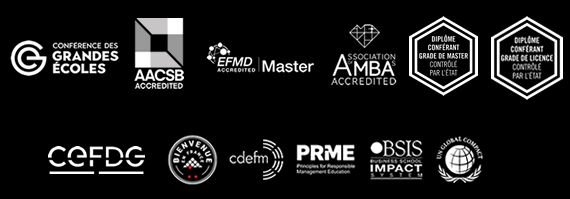On one hand, hard skills: technical competences and knowledge one must own to occupy a high-level position. On the other hand, soft skills: interpersonal skills, emotional intelligence and all qualities needed to manage a team, communicate efficiently and solve problems.
Hard skills are taught in business schools worldwide. They are the least one can expect from a general education in management. Soft skills are far more complex and subtle. Nevertheless, it is possible to develop and improve them when studying in a business school. Ready?
1. Teamwork
In a business school, classes are not built on a unique model. Some professors choose a flipped class method, others put an emphasis on view exchange, academic research or oral presentations with peer assessment. In any case, teamwork is central.
Students get together to think and work on real-life cases and issues. These situations do develop hard skills, but not only.
Teamwork implies an ability to set one’s priorities, communicate well with others, face critical situations, look for common ground or on the contrary, to convince others so as to take the right decisions in a given amount of time.
Teamwork is much deeper than it may seem at first sight, because the personal outcome is not obvious. Soft skills develop within the group’s interactions. Business school faculty is well aware of this: they support and organise teamwork so as to enhance individual soft skills.
2. The perks of international exposure
At French business school EMLV, all students spend year three abroad. Of course, the Paris La Défense school also welcomes incoming international students for a semester or more.
They follow classes, in French and in English with the local students. This makes for a student body composed of various cultural backgrounds.
For all students, this diversity implies showing comprehension and listening skills. All situations will not be faced the same way by a Chinese, Russian, Canadian or Swedish student. These interactions always bring precious learning lessons.
This is the best way students may benefit from international exposure, without leaving campus.
3. A cross-sector educational approach
Some business schools do go beyond a mere programme in management. There are programmes that make a significant difference, bringing added value to the educational path.
Cross-sector programmes make the most of a collaboration with schools of digital, engineering, tourism, IT… This one-of-a-kind approach prefigures the mixity future graduates will experience in their professional lives.
In these cross-sector classes or projects, business school students work with future engineers or designers. A great occasion to highlight each and everyone’s knowledge and skills. And a way to get to know new professional cultures.
This cross-discipline education enhances curiosity, humility and the will to innovate. Another positive outcome are the soft skills business school students develop before starting their career.
4. Educational projects
Many business schools put the project mode at the heart of their educational approach, a way for students to put theoretical knowledge into practice.
These projects were designed to offer a freedom of organisation, helping students go beyond their personal limits. They bring new knowledge but above all, they enhance soft skills.
Business school students must look for information, organise their schedule, anticipate on challenges to come… The learning outcomes help reveal individual personalities.
Courses in business schools are not only about transmitting a theoretical knowledge. They are also a way to bring forward professionalisation, interpersonal skills and emotional intelligence. So many occasions to improve soft skills while gaining hard skills.
Are you looking to study abroad in France? Find out more about exchange programmes, MBAs and MScs at EMLV, business school in Paris.





















